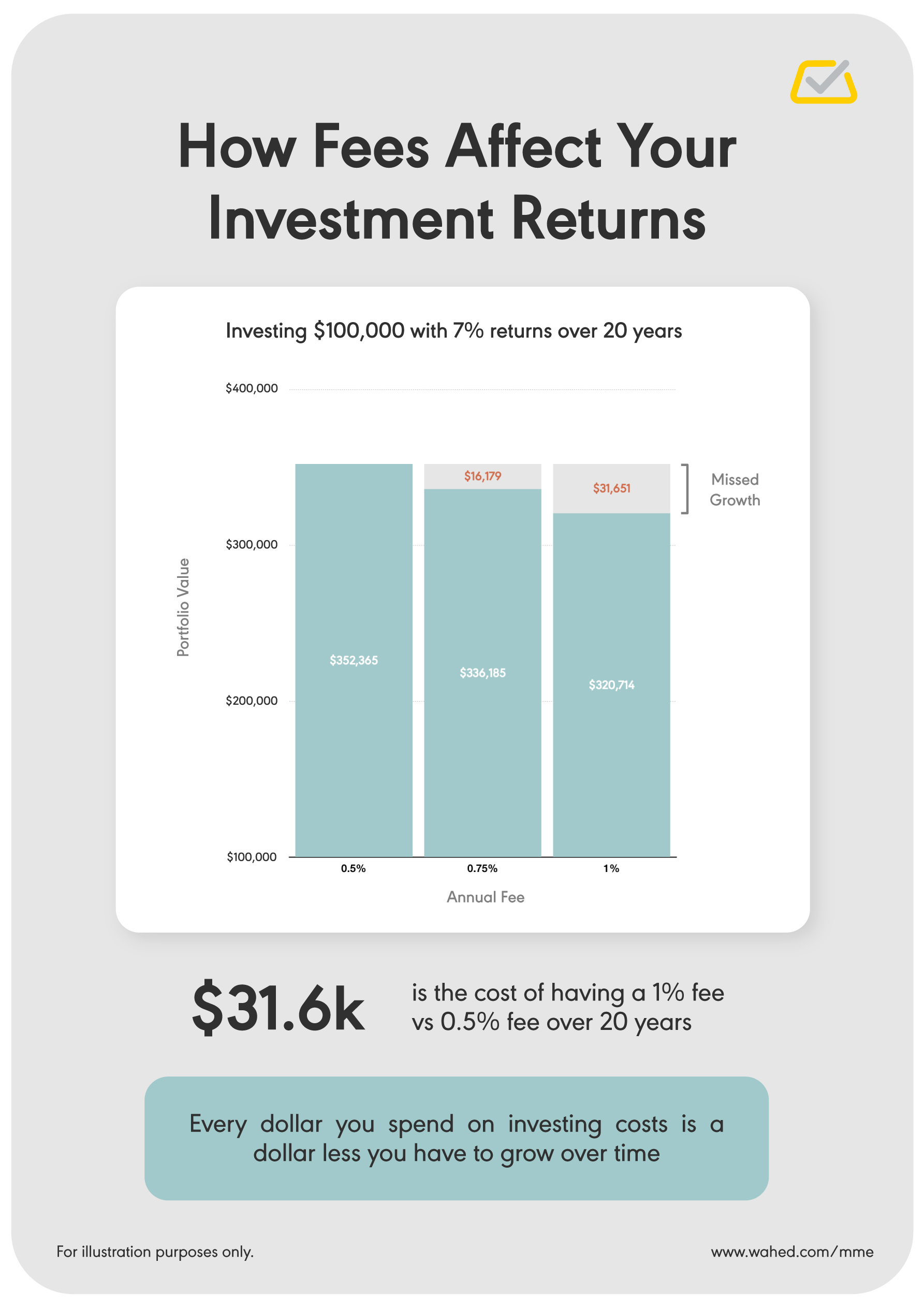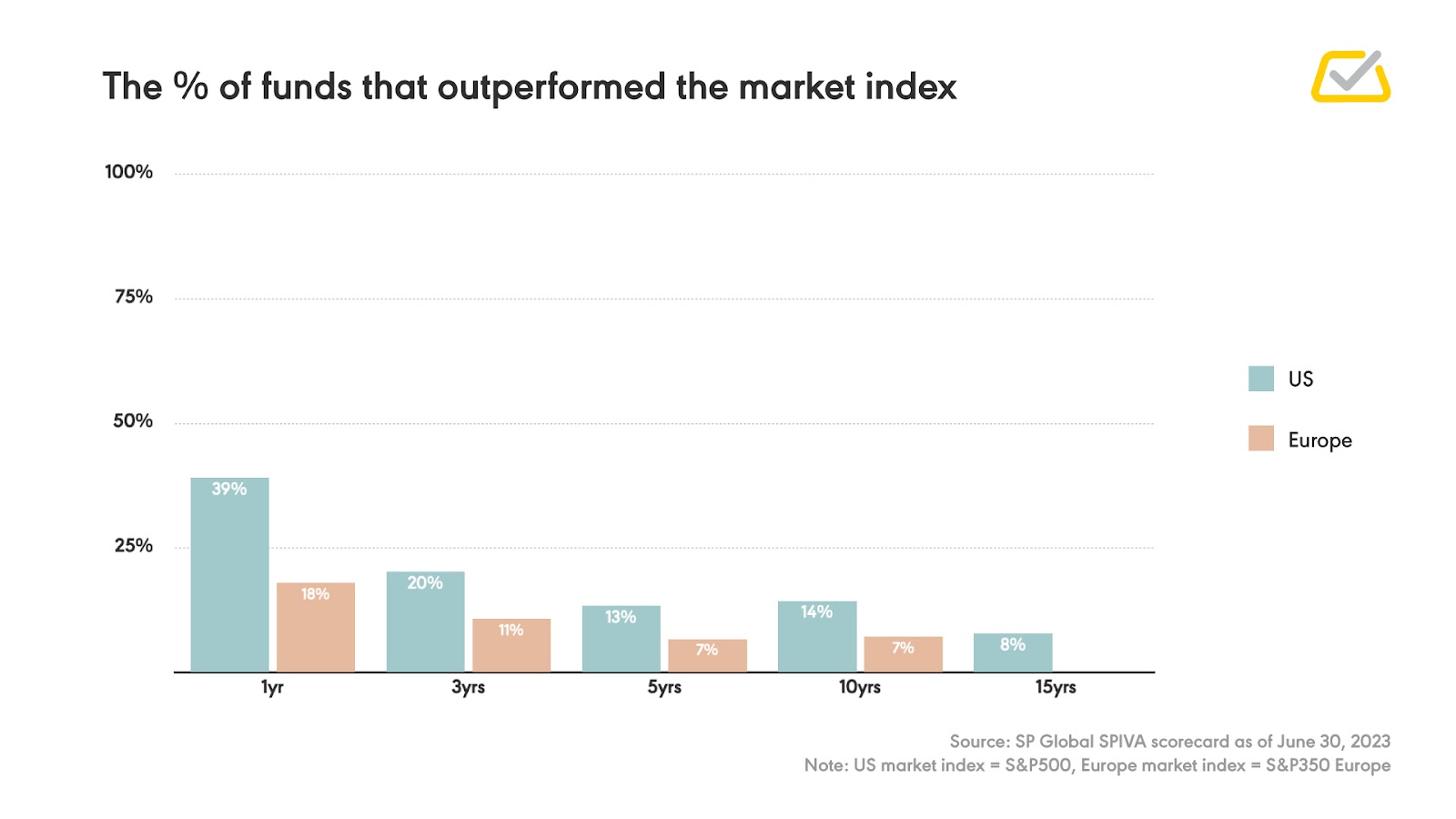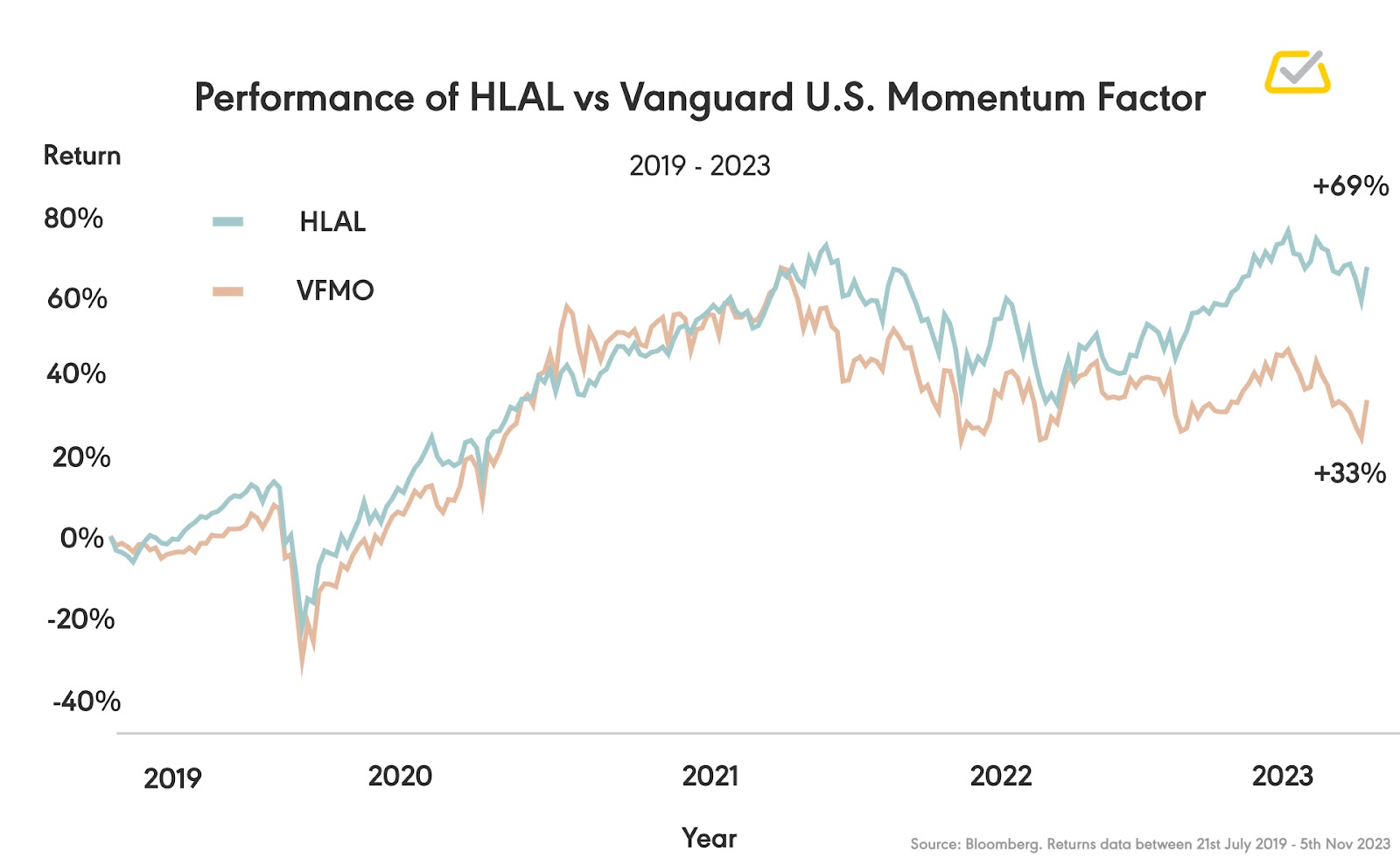Why Passive Investing May Be Better Than Active Investing

Should you try to beat the market?
Or is there an easier way to make money when investing?
These questions are at the heart of the debate between passive investing and active investing.
This article explores why, for retail clients, passive investing might just be the easier way to grow your wealth when investing, especially when one considers costs, consistency, historical performance, time commitment, risk, and diversification.
What’s the Difference between Passive Investing and Active Investing?
Active investing means trying to "beat the market" via trading investments that you think will outperform the market.
With active trading you either invest your time in learning all about investing to make trades or you pay an advisor to do it on your behalf. The goal is to get higher returns than the overall market.
Passive investing takes a simpler road. You don't try to beat the market - you join it! You invest in a diversified portfolio of assets to track the performance of a market index or a specific asset class (like stocks and shares). The idea is that when the market goes up, your funds go up too.
The Case for Passive Investing
1. Lower Costs
One of the most compelling arguments in favor of passive investing is the significantly lower costs associated with it.
With passive investing, there’s no active management required which means that they come with substantially lower fees and expenses compared to actively managed funds.
Conversely, active investing typically comes with higher fees. Active investors constantly buy and sell assets, trying to "beat the market," which leads to higher transaction costs and higher management fees as you’re paying for the manager’s expertise.
This is backed up by the data. Morningstar’s research has found that only 13% of active funds have an annual fee of less than 0.5%, compared to 90% of passive funds1.
Every dollar you spend on investing costs is a dollar less you have to grow over time. Over the long term, even seemingly small fees can substantially erode returns due to the power of compound returns.
To see this visualised, we’ve created the below infographic to show the impact of fees on your investment. As you can see, high fees can be costly to your investment returns!

2. Consistency in Performance
Passive investments aim to mimic the performance of a given market index or asset class. This approach offers a level of predictability that is often absent in active investing, where fund managers attempt to outperform the market through stock selection, timing, and other strategies.
With that said, it’s important to bear in mind that past performance is no guarantee of future results. This point is just here to illustrate that with passive investing, there is a track record that has been evidenced over time.
Historically, many actively managed funds have struggled to consistently beat their benchmarks. In fact, numerous studies have shown that a significant majority of active funds underperform their respective market indices over extended periods.
For example, the SPIVA scorecard is a widely cited report that tracks the performance of actively managed funds against their benchmark S&P indexes. In their mid-year 2023 scorecard, they found that over last the 15 years, 92% of large-cap equity funds in the US underperformed against the S&P 500.

The SPIVA scorecard provides compelling evidence that even professional fund managers have difficulties consistently picking stocks that outperform broad market indexes over the long run. As you can see from the chart, the success rate falls over time.
Passive investors, on the other hand, can reasonably expect to achieve results that closely mirror the overall market's performance. By avoiding the difficulties of stock-picking, passive indexed approaches offer a reliable path to grow wealth over long time periods based on historical data.
3. Historical Performance
Passive investment strategies, such as those tracking major market indices like the S&P 500 or the FTSE Shariah USA Index, have consistently shown competitive performance over the long term. These indices reflect the overall growth and health of the economy and typically appreciate in value over time.
For instance, HLAL which is a passive ETF that tracks the FTSE Shariah USA Index, and represents a diversified basket of over 200 shariah-compliant large-cap U.S. stocks, has shown remarkable growth since its inception in 2019.
As we mentioned before, passive indexes often outperform active strategies. Let’s compare HLAL to VFMO. VFMO which stands for Vanguard U.S. Momentum Factor ETF is an active ETF by Vanguard, one of the world's largest investment companies with $7.7 trillion in global assets under management. VFMO invests in US stocks with strong recent performance and aims to beat the market.
As you can see from the below chart, HLAL has outperformed VFMO since inception returning over double the returns (+69% vs +33%). To bring this point home, if you invested $100k with both ETFs during this period, with HLAL, your $100k would have grown to $169k whereas with VFMO, it would have grown to $133k. This is a great example of how a passive ETF like HLAL can outperform active ETFs.

While there are periods of market volatility and downturns, history has demonstrated that over extended timeframes, these indices tend to recover and trend upward. Passive investors benefit from this historical performance without trying to outguess the market's short-term movements.
4. Reduced Stress and Time Commitment
Active investing can be a demanding and stressful endeavor. It requires continuous monitoring of the markets, in-depth research, and rapid decision-making. The pressure to make profitable trades can lead to emotional stress and anxiety.
Given that investing is a long-term pursuit, it can take years before an active investor has enough data to conclusively determine whether their active trading strategy has paid off. Not only do you invest a lot of up-front time researching opportunities and constructing your portfolio, you have to dedicate considerable time each year to review your portfolio and look at new opportunities.
In contrast, passive investors adopt a more relaxed approach. They commit to a long-term perspective, which often requires minimal intervention and oversight. This hands-off approach can be particularly appealing to individuals who have busy lives, careers, or other commitments, as it allows them to build wealth without constantly being tied to maintaining their investment portfolio.
5. Risk Reduction through Diversification
Diversification is a core principle of passive investing. By holding a broad range of assets within a passive portfolio, investors can significantly reduce their exposure to individual company risk.
This strategy guards against the possibility of a single investment or asset performing poorly and dragging down the entire portfolio.
Key Considerations
While passive investing has many advantages, it's not without its considerations and potential drawbacks:
- Market Risk: Passive investors are exposed to market fluctuations, and they must be prepared for the occasional bear market or downturn. A long-term perspective is crucial to weather such storms.
- Lack of Flexibility: Passive investors have limited control over their investments because they are committed to mirroring a specific index. They can't make quick adjustments to capitalize on emerging trends or opportunities.
However, passive investing advocates would argue that this is the point of passive investing anyhow. The idea is to pick a long-term strategy and stick with it instead of trying to catch the next big thing. - Limits your growth as an investor: When you are actively engaged in researching companies, evaluating financials, tracking markets, and deciding when to buy and sell stocks yourself, you build critical knowledge about investing.
However, the rationale behind passive investing is often either 1) recognizing you don’t have the time or interest to effectively learn how to research and analyze stocks in-depth or 2) acknowledging that developing stock-picking skills that reliably beat the market is very difficult, even for professionals.
How Can You Start Investing Passively?
As we’ve seen, passive investing is a low-effort and low-cost way to grow your wealth.
Of course, for Muslim passive investors, you want to ensure that you only invest in shariah-compliant investments. That’s where we come in.
Wahed allows Muslims to invest their money in a diversified, low-cost and most importantly shariah-compliant way. We do this by investing your money into different investments that are matched to you, and that you feel comfortable with. Just choose your desired risk level and we’ll handle the rest.
Wahed has already helped 300,000 Muslims across the world to grow their wealth in a way that is in line with their faith and values.
To start your journey to halal* investing and make your money work for you, sign up here.
[1] https://www.morningstar.co.uk/uk/news/215822/a-closer-look-at-uk-fund-costs.aspx
*The term 'Halal' denotes that it is permitted and follows Islamic law
Risk Warning: Equity investments are not readily realisable and involve risks, including loss of capital, illiquidity, lack of dividends and dilution, and it should be done only as part of a diversified portfolio. Investments of this type are only for investors who understand these risks. You will only be able to invest in the company once you have met our conditions for becoming a registered member.
Please visit www.wahed.com/uk/ventures/risk for our full risk warning.
Risk Warning: As with any investment, a Wahed Invest Ltd investment puts your money at risk, as the value of your investment can go down as well as up. The tax treatment of your investment will depend on your individual circumstances and may change in the future. If you are unsure about whether investing is right for you, please seek expert financial advice.
Please visit www.wahed.com for our full terms and conditions
Maydan Capital Limited, trading as WahedX, is registered in England and Wales (Company No. 13451691), registered office: 87-89 Baker Street, London, W1U 6RJ, UK. Maydan Capital Ltd (FRN: 963613) is an appointed representative of Wahed Invest Ltd (FRN: 833225), an authorised and regulated firm by the Financial Conduct Authority.Wahed Invest Ltd. is registered in England and Wales (Company No. 10829012), registered office: 87-89 Baker Street, London, W1U 6RJ, UK and is authorised and regulated by the Financial Conduct Authority: FRN 833225.
Subscribe For More Islamic Finance Content
As with any investment, a Wahed Invest Ltd investment puts your money at risk, as the value of your investment can go down as well as up. The tax treatment of your investment will depend on your individual circumstances and may change in the future. If you are unsure about whether investing is right for you, please seek expert financial advice.
Wahed Invest LLC (Wahed) is a US Securities and Exchange Commission (SEC) registered investment advisor. Wahed Invest provides brokerage services to its clients through its brokerage partner Apex Clearing Corporation, a member of NYSE - FINRA - SIPC and regulated by the SEC and the Commodity Futures Trading Commission. Registration does not imply a certain level of skill or training. Wahed does not intend to offer or solicit anyone to buy or sell securities in jurisdictions where Wahed is not registered or a region where an investment practice like this would be contrary to the laws or regulations. Any returns generated in the past do not guarantee future returns. All securities involve some risk and may result in loss. Any performance displayed in the advertisements or graphics on this site are for illustrative performances only.
Disclaimer: Wahed Technologies Sdn Bhd ("Wahed") is a Digital Investment Manager (DIM) licensee issued by Securities Commission Malaysia (eCMSL/ A0359/2019). It is part of Wahed Inc. Wahed is authorized to conduct a fund management business that incorporates innovative technologies into automated portfolio management services offered to clients under a license issued pursuant to Schedule 2 of the Capital Markets Services Act 2007. All investments involve risks, including the possibility of losing the money you invest, and the track record does not guarantee future performance. The history of returns, expected returns, and probability projections is provided for informational and illustrative purposes, and may not reflect actual future performance. Wahed is not responsible for liability for your trading and investment decisions. It should not be assumed that the methods, techniques, or indicators presented in this product will be profitable, or will not result in losses. The previous results of any trading system published by Wahed, through the Website or otherwise, do not indicate future returns by that system, and do not indicate future returns that will be realized by you.
Wahed Invest Limited is regulated by ADGM’s Financial Services Regulatory Authority (“FSRA”) as an Islamic Financial Business with Financial Services Permission for Shari’a Compliant Regulated Activities of Managing Assets and Arranging Custody [Financial Permission No. 220065]. Our ADGM Registered No. is 000004971.
Wahed assumes no obligation to provide notifications of changes in any factors that could affect the information provided. This information should not be relied upon by the reader as research or investment advice regarding any issuer or security in particular. Any strategies discussed are strictly for illustrative and educational purposes and should not be construed as a recommendation to purchase or sell, or an offer to sell or a solicitation of an offer to buy any security. Furthermore, the information presented may not take into consideration commissions, tax implications, or other transactional costs, which may significantly affect the economic consequences of a given strategy or investment decision. This information is not intended as a recommendation to invest in any particular asset class or strategy or as a promise of future performance.
There is no guarantee that any investment strategy will work under all market conditions or is suitable for all investors. Each investor should evaluate their ability to invest long term, especially during periods of downturn in the market. Investors should not substitute these materials for professional services and should seek advice from an independent advisor before acting on any information presented. Any links to third-party websites are provided strictly as a courtesy. We make no representation as to the completeness or accuracy of information provided at these websites nor do we endorse the content and information contained on those sites. When you access one of these websites, you are leaving our website and assume total responsibility and risk for your use of the third-party websites.





